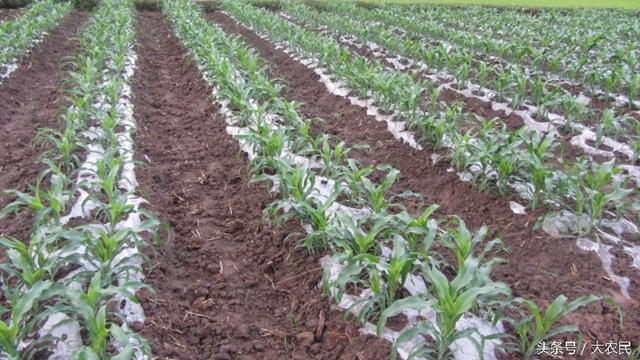Merits and demerits of Maize cultivation with plastic Film mulching
In southwest China, due to the influence of different periods of rain and heat and insufficient accumulated temperature, farmers were short of Rain Water in the early stage of corn planting, or because the soil temperature was low, corn seeds could not germinate normally, resulting in rotten or dry seeds. in the later stage, due to the lack of accumulated temperature in some areas, corn can not mature normally, which brings great obstacles to corn production.
For this reason, agricultural scientific and technological workers have introduced the cultivation technology of plastic film mulching. Through plastic film mulching cultivation, it can improve soil temperature and maintain soil moisture. In the early growth process of maize, plastic film mulching can effectively increase soil temperature by 3-7 ℃ and ensure normal emergence of maize. In the later stage, plastic film can not only preserve soil moisture and improve drought resistance, but also increase the accumulated temperature and ensure the normal maturity of corn in some mountainous areas. It can be said that the cultivation technology of plastic film mulching has brought great progress for the cultivation of maize in the cold mountain areas of southwest China, and it is also known as the "food and clothing project" for farmers in mountain areas to shake off poverty and become rich.

However, plastic film mulching has also brought great pollution to the farmland ecological environment, that is, plastic film residue. Agricultural plastic film is difficult to degrade under natural conditions. the residual agricultural film inhibits the growth of soil microorganisms, destroys the physical and chemical structure of soil, affects the normal growth and development of crops, and brings losses to agriculture.
1. Difficult to degrade and destroy soil structure.
At present, the agricultural plastic film is made of polyethylene, which is difficult to decompose and can remain in the soil for hundreds of years. Farmland residual film has a great destructive effect on the formation of good physical structure of soil, inhibits the growth of microorganisms in soil, and has a great influence on the formation of good physical and chemical properties of soil. Due to the existence of a large number of agricultural residual film, it destroys the original structure of the soil and makes the soil lose the characteristics of water and fertilizer conservation. In serious cases, it will cause serious consequences such as groundwater infiltration and soil secondary salinization, resulting in crop yield reduction.
2. Agricultural residual film seriously hinders the growth and development of crops.
Due to the change of soil structure and the decrease of soil fertility, the growth and development of crop roots is difficult, which affects the normal absorption of nutrients and water. It is mainly manifested in difficult seed germination, weak growth potential, weak stress resistance, low yield, poor quality and so on. At the same time, the existence of residual film will cause irrigation and uneven nutrition, affecting the normal absorption and growth of crops.
3. Harm to animal husbandry
The residual film in farmland is lack of centralized and unified treatment, and it remains for a long time in the agricultural production environment and rural living environment, which is mixed with all kinds of forage grass, resulting in mistaken feeding of livestock, digestive tract diseases of livestock, and even death, and losses to farmers.
4. the residual film pollutes the rural living environment.
The residual film in farmland is difficult to decompose, and it remains in the living environment for a long time, and there is no special treatment for the residual film in rural areas, so the residual plastic film causes serious visual pollution to the production and living environment in rural areas. there are great obstacles to the promotion of the construction of a new socialist countryside. At the same time, the partial decomposition of the residual film produces toxic substances and heavy metals infiltrate into the groundwater, which poses a threat to the safety of production and domestic water in rural areas.
At present, the basic reason for the increasing amount of farmland residual film in China is that the amount of farmland residual film is high, it is not easy to degrade, and the high recovery cost leads to small annual recovery.
The degradable film began to degrade after about 30 days, which could not play the role of heat preservation and moisture conservation.
Although the country is making efforts to promote biodegradable film in some places, on the one hand, the cost of biodegradable film is high, the benefit of planting corn itself is low, and farmers are unwilling to use it to increase the cost of plastic film. On the other hand, the degradable film shows premature degradation in production, which can not play the role of heat preservation, moisture conservation and increase the effective accumulated temperature, so farmers are not willing to use it.
If you like this article, please forward it more often. If there is a reprint, please indicate the source.
- Prev

There are many embarrassing things in poor childhood: dream of digging eggs into a pile of wheat bran to get rich
There are many embarrassing things in poor childhood: dream of digging eggs into a pile of wheat bran to get rich
- Next

Xiewen Village: amorous feelings, live in Yizhai, live in green ecological industry and become rich
Xiewen Village: amorous feelings, live in Yizhai, live in green ecological industry and become rich
Related
- A course of planting techniques and methods on how to grow carrots
- How to plant the latest tulips?
- Is it better to pick tea in the morning or in the afternoon? When is the best time for tea to be picked? what is the third or fifth tea?
- Launch Yuanxiao Happy combination Haocha + Tea Yuan healthy Taste
- Penghu Tourism "Fireworks 20 Parade with You"
- 2022 West Lake Happiness holds "Digital Revitalization Voucher" and draws iphone13 and laptop.
- Banqiao Fuzhou social houses are designed to change start-up combined with police elimination to create a safe and livable environment
- The convenient measure of "mechanical weeding" in Xinbei has been abused and the Agriculture Bureau has imposed heavy penalties on the illegal land consolidation.
- Changgeng University Joins Hands with Four Memory Factories to Rescue Memory Talent Shortage
- The list of Taiwan's top 100 MVP managers is listed by the Director-General of the Farmers' Association of Sanxia District.

